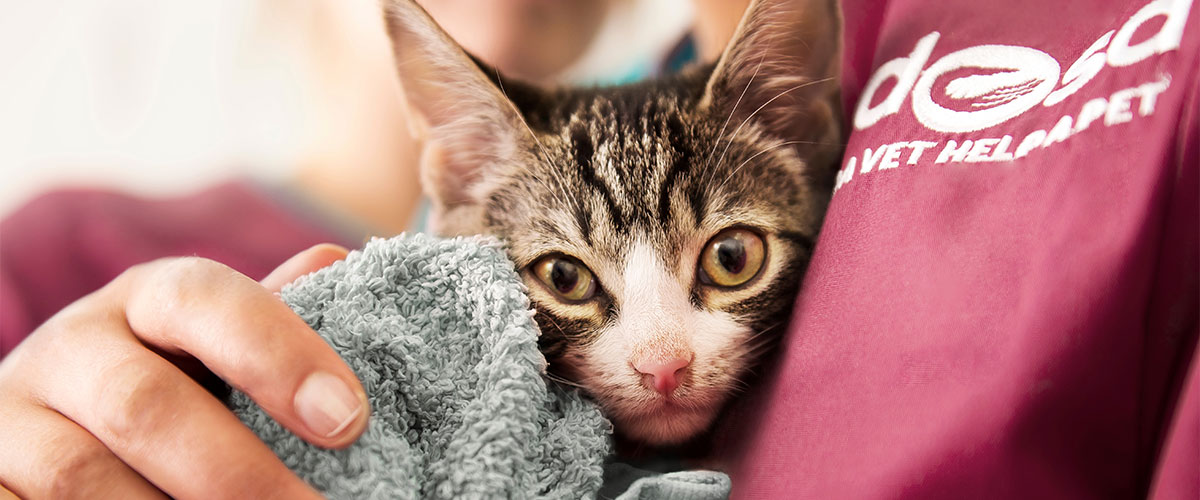Heart disease and cardiomyopathy in cats
Overview
- Heart disease is a relatively common problem in pet cats.
- There are a few different types, but they all tend to cause to similar symptoms.
- Low energy and breathing problems are two of the most common symptoms of a heart problem.
- Fortunately, many types of heart disease in cats can be well managed with medication and monitoring.
- Always speak to your vet if you are concerned about your cat’s heart.
General information
There are a few different types of heart disease that can affect cats. It’s a problem that most common in middle aged-older cats, but can also sometimes affect kittens (in rare cases).
It can be scary when your cat is diagnosed with a heart problem, but fortunately, most cats can be well managed with medicines, close monitoring and careful weight/exercise control.
In the late stages of a heart problem, heart disease can turn in to heart failure, Heart failure is when the heart isn’t able to pump blood around the body properly anymore. Heart failure often leads to fluid on the lungs and in other parts of the body and this is usually the stage at which symptoms develop.
Types of heart disease
Some of the common types of heart disease in cats include:
Hypertrophic Cardiomyopathy (HCM) - HCM is the most common type of heart disease in cats, it causes the heart muscle to thicken and prevents it from pumping blood around the body properly. Some breeds, such as Maine Coons and Ragdolls, are more likely to get HCM.
Other types of cardiomyopathy - although they are much less common, cats can also get Dilated Cardiomyopathy/DCM (where the heart muscle becomes weak and floppy), and Restrictive Cardiomyopathy/RCM (where the heart muscle becomes damaged and stiff).
Arrhythmias - an abnormal heart beat rhythm that can cause fainting episodes
Pericardial disease - problems with the sack around the heart.
Congenital heart disease - if a kitten is born with a heart problem, we call it ‘congenital heart disease’. Congenital heart disease is a very serious problem to have, but fortunately, it’s also very rare.
As well as the types of heart disease listed above, other conditions, such as hyperthyroidism and high blood pressure can sometimes lead to heart problems.
Symptoms
Symptoms of heart disease in cats include:
- A heart murmur
- your vet will be able to hear whether you cat has a murmur using their stethoscope
- not all heart murmurs indicate a problem
- Fast, shallow, noisy or heavy breathing
- Often one of the first symptoms of heart disease
- Lethargy (low energy)
- Exercise intolerance (slowing down when playing or running)
- Panting or breathing with an open mouth
- Collapse/fainting
- Weight loss
- Abdominal swelling (bloated belly)
When to contact your vet
Contact your vet if you’re worried about your cat’s heart, or you have noticed any of the symptoms listed above. Most cats don’t show signs of heart disease until it’s already serious, so if you’ve noticed any worrying signs it’s important to get your cat checked as quickly as possible.
Treatment
The treatment your cat needs will depend on the type of heart disease they have, but might include:
- Monitoring. In the early stages, some heart problems don’t need treatment. If this is the case, it’s important for your cat to have regular check-ups to make sure their problem isn’t getting any worse, and that it’s detected quickly if it is.
- Heart medication. Most common types of heart disease can be managed with medicines. Heart medications won’t cure the problem, but it can significantly slow it down and reduce symptoms. It’s important to be aware that, even with treatment, most cats with heart disease develop worse symptoms in time.
- Anti-clotting medications - blood clots inside the heart are common in cats with heart problems, so your cat may need medication (such as asprin or clopridogrel) to prevent any forming. Blood clots are dangerous because they can get lodged in smaller vessels, causing problems such as a saddle thrombus.
Prevention
Screening programs. Some breeds are prone to heart disease, for example Hypertrophic Cardiomyopathy (HCM) in Maine Coons and Ragdolls. Screening programs have been set up to prevent heart problems being continually passed from parents to their kittens. If you are considering getting a cat, make sure you do your research and check what screening might be necessary before you pick a kitten or breeder. Going for regular health checks with your vet, such as annual vaccination appointments, will also help your vet pick up any problems before you start to see signs at home.
Cost
Treatment for heart disease can become very expensive especially as it usually involves life-long monitoring and medications. It’s important to speak openly to your vet about your finances, the cost of treatment, as well as what you think is right for your cat. There is often more than one treatment option, so if one doesn’t work for you and your cat then your vet may be able to offer another.
Consider taking out Cat Insurance as soon as you bring your cat home, before any signs of illness start. This will give you peace of mind that you have some financial support if they ever become unwell.
Published: July 2020
Did you find this page useful?
Tell us more
Please note, our vets and nurses are unable to respond to questions via this form. If you are concerned about your pet’s health, please contact your vet directly.
Thank you for your feedback
Want to hear more about PDSA and get pet care tips from our vet experts?
Sign up to our e-newsletter
Written by vets and vet nurses. This advice is for UK pets only. Illustrations by Samantha Elmhurst.

